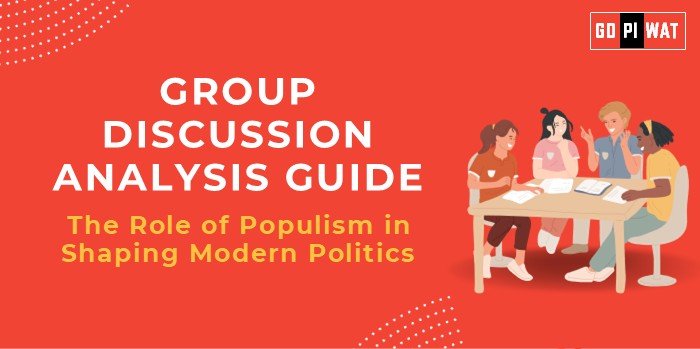📋 Group Discussion (GD) Analysis Guide
🗳️ The Role of Populism in Shaping Modern Politics
🌐 Introduction
Populism, marked by its appeal to “the people” against perceived elites, has reshaped modern political landscapes. From economic policies to international relations, populist movements have profoundly influenced governance models and public discourse globally.
📊 Quick Facts & Key Statistics
- 🌍 Global Impact: Between 1990 and 2018, the number of populist leaders increased fivefold, from 4 to 20, significantly altering international relations and domestic policies.
- 📈 Voter Base Shift: Working-class voters are gravitating toward populist platforms, while high-earning, college-educated voters lean toward progressive economic policies.
- 💰 Economic Link: Financial crises correlate with a 40% increase in populist vote share, emphasizing the role of economic insecurity.
- 📱 Social Media Role: Populist parties dominate Facebook, leveraging high engagement for mass outreach.
👥 Stakeholders and Their Roles
- Populist Leaders: Voice grievances, promote protectionism, and challenge traditional institutions.
- Political Institutions: Balance populist narratives while preserving democratic norms.
- Citizens: Represent “the people,” driving populist movements.
- Global Entities: Act as collaborators or opponents to populist agendas.
✅ Achievements and Challenges
🎉 Achievements:
- Highlighted systemic inequalities and marginalized voices.
- Increased voter turnout and political engagement.
- Promoted direct policy interventions addressing economic grievances.
⚠️ Challenges:
- Institutional erosion and weakening of checks and balances.
- Increased polarization and reduced social cohesion.
- Isolationist tendencies impacting global cooperation.
🌍 Global Comparisons:
- Success Example: Scandinavian populists integrate social welfare with nationalism.
- Challenges: Hungary’s decline in press freedom.
🗣️ Effective Discussion Approaches
Opening Approaches:
- “Between 1990 and 2018, the rise of populism reshaped global political dynamics, reflecting economic and cultural discontent.”
- “Populism bridges gaps between the governed and governance, but at what cost to democracy?”
Counter-Argument Handling:
- Use examples like Brexit to illustrate benefits while addressing long-term institutional risks.
🔍 Strategic Analysis of Strengths & Weaknesses
- Strengths: Amplifies marginalized voices, enhances political accountability.
- Weaknesses: Short-term focus and governance instability.
- Opportunities: Bridging economic divides and institutional reform for inclusivity.
- Threats: Democratic backsliding and economic isolation.
📚 Structured Arguments for Discussion
- Supporting Stance: “Populism ensures that governments address grassroots concerns, fostering inclusivity.”
- Opposing Stance: “Populist governance often undermines institutional integrity, threatening long-term stability.”
- Balanced Perspective: “While populism addresses systemic issues, its solutions often create new challenges.”
📖 Connecting with B-School Applications
- Real-World Applications: Studying populism’s impact on global trade policies or voter behavior trends.
- Sample Questions:
- “How does economic insecurity fuel populism?”
- “Evaluate the role of social media in populist movements.”
- Insights for Students: Examine populism’s effects on economic policymaking and cross-cultural leadership styles.


